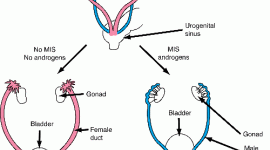Trauma
harm inflicted on intersexed children and their families by current medical practice
surgical harm attested to by adult intersexuals
debate on the question of childhood surgical intervention in intersexed births
The argument is always that the surgery makes the parents more comfortable. But counseling can do that too, and it is not irreversible in quite the same way as surgery. The question is: Do we use surgery to make parents more comfortable in the short run in the (often mistaken) belief that this will improve the psychological outcome for the intersexed child? Even though it may me an severe impairment of sexual function in adulthood?
-------
Intersexuality is essentially a cosmetic difference. Why, then, are minors denied the right to consent or refuse treatment? Why aren't the parents told to allow the child to grow up, to "wait and see?" Why is all the potential for choice erased in infancy? If parents were actually informed about what these cosmetic procedures entail, would they be less inclined to grant permission? Why is it that in this era of informed consent, no one protests when medical textbooks advise physicians to dissemble to parents about intersex diagnoses and "corrective" surgical procedures?
This question requires us to take a closer look at the meaning of "informed" consent. Currently intersex specialists simply assert that the child is ill, that surgery can cure the child, that the child's mental health will be at great risk without surgery, and that surgery presents no risk of harm. Parents assent, and the child is scheduled for the same genital surgery which many adult patients characterize as sexual mutilation.
Does the intersex specialist lie to the parents? From my point of view, yes. But from the physician's and parents' point of view, no. They actually believe -- a convenient belief -- that it is the health of the child that they are protecting. And as to the damage? Recently, I attempted to dissuade an acquaintance from permitting a clitoroplasty to be performed on her months-old infant . She responded, "Well, the clitoris isn't important to many women, so why should it matter? They'll just fix her little problem and be done with it." I wish I had proxy over her clit.
What I wish for most is that all cases of a primarily cosmetic nature be left alone until the minor has reached an age at which s/he can articulate his or her desires. I am not saying that surgery should never happen, but the prognosis at a purely physical level is much better if the body has already finished growing. And I would be inclined to argue that, illusory or not, the ability to choose for oneself favorably affects the results.
-----------
The complaint of many intersexuals is that when gender reassignment is discovered, things get worse rather than better because their lives continue to be controlled by others, and they experience all sorts of additional traumas. These may be repeated, insensitive, and humiliating interviews; a frightening medical exam; a confrontation involving the perpetrator or the victim's family; an unpleasant placement experience; treatment that the child finds unhelpful or traumatic; and court testimony. Often the most problematic aspects of intervention are not knowing what is going to happen and having no say in decisions. It is important that the intervention not exacerbate the child's sense of powerlessness
Does sexual trauma have an impact on the mental and physical health of the victim?
Having been a victim of rape appears to significantly impact on the overall health of the victim. According to the 1988 report, "Rape in America," nearly one-third (31%) of all rape victims develop Post Traumatic Stress Disorder (PTSD) sometime during their lifetime. Additionally, researchers are beginning to notice a relationship between PTSD symptoms and an increase in physical health problems and reports of "not feeling well." What is Post Traumatic Stress Disorder (PTSD)? Post Traumatic Stress Disorder is a recurrent emotional reaction to a terrifying, uncontrollable, or life-threatening event. The symptoms frequently develop after a person's sense of safety and security is violated. Individuals with PTSD experience a variety of symptoms that often impede their daily lives. These may include sleep disturbances, nightmares, emotional instability, feelings of fear and anxiety around seemingly non-threatening situations, impaired concentration, and increased stress or problems in intimate and other interpersonal relationships. These reactions are common after a trauma and are pat of the initial adjustment process.
If you have never discussed your trauma with anyone and you are very frightened about talking about it now, and even wonder if you can. What can you do about this fear?
Unfortunately, this is a very common fear of women who have experienced sexual trauma. In fact, it is estimated that only sixteen (16) percent of the rapes that occur in this country are ever officially reported. Many of the reasons for this silence are based on society's stereotypes of women who have experienced sexual trauma. It is important to remember that health care professionals have become increasingly sensitized to the experience of sexual trauma and the impact it can have on the victim. As a result, they are more able to respond to the fears and anxieties that the victim may be experiencing. They will also understand the difficulty in discussing these reactions with another person and will be able to help the victims express themselves in a way that is most comfortable.
The Aftereffects of Sexual Trauma
Many veterans, who experienced an incident of sexual or personal trauma as a result of assault or harassment while they served on active military, have had no professional counseling and have never discussed it with anyone. The victims are embarrassed and have legitimate concerns about confidentiality. They may experience re-traumatization and have uncomfortable and frightening feelings when they recall the incident. Victims may have strong misgivings about the need or purpose for talking about the incident so long after it actually occurred. VA counselors know that people, who have been traumatized, can be successfully treated and that it is important to the overall health of the victim to talk though these upsetting and terrifying experiences.
- avoidance of places or objects which recall memories of the traumatic incident
- feelings that something is missing or not right
- depression, alcohol and substance abuse
- suicidal thoughts
- recurring and intrusive thoughts and dreams about the trauma incident
- non specific health problems
- relationship problems
next: Sexual Differentiation
~ all inside intersexuality articles
~ all articles on gender
APA Reference
Staff, H.
(2007, August 13). Trauma, HealthyPlace. Retrieved
on 2026, March 5 from https://www.healthyplace.com/gender/inside-intersexuality/trauma

